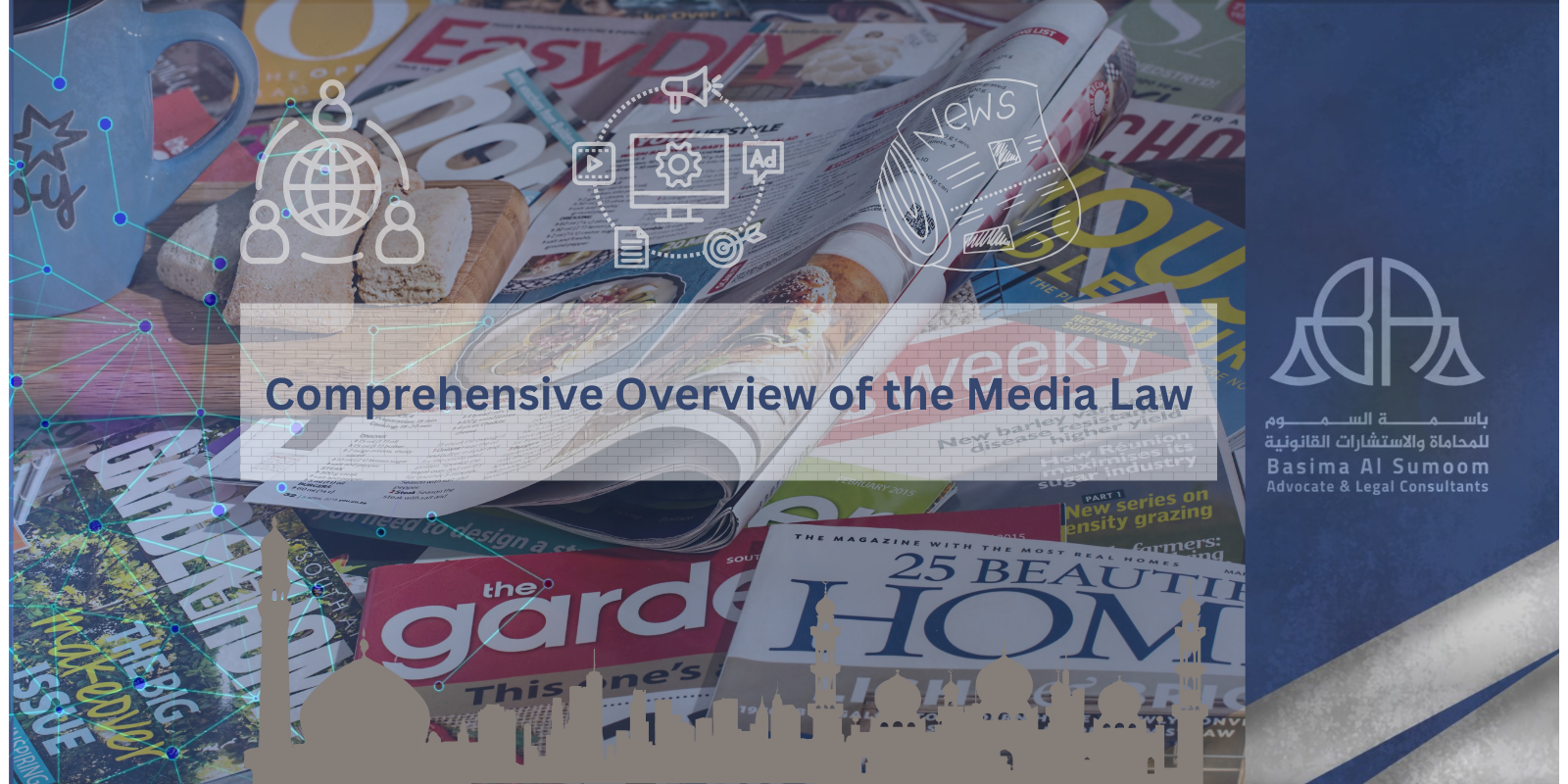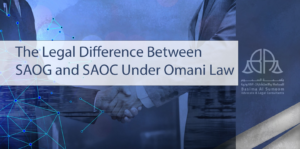Introduction
Royal Decree 58/2024 promulgating the Oman New Media Law issued dated 10 November 2024, is a legislation designed to regulate the media form in Oman. By upholding ethical practices, protecting national interests, and ensuring responsible reporting, the law establishes clear guidelines for media institutions, professionals, and related activities. It covers licensing, media rights, obligations, publications, artistic works, and penalties for violations.
This article provides an in-depth summary of the law, highlighting key aspects from its seven chapters.
General Provisions
Chapter 1 of Oman’s Media Law defines key terms and sets general provisions for media activities in the country. It outlines the roles of the Ministry of Information and the Minister, covering all forms of media, including print, broadcast, and electronic. The law guarantees freedom of information, including the right to express opinions, access, and circulate information, while prohibiting prior censorship. Media content is regulated, with restrictions on advertisements, trial-related publications, and content directed by the Ministry. It also mandates that media entities obtain approval for accepting donations or subsidies, ensuring adherence to ethical standards. Importantly, the law stipulates that publications or artistic works may not be imported without written permission from the Ministry, including art displayed inside premises covered by diplomatic immunity.
Licensing
Chapter 2 of Oman’s Media Law outlines the regulations for practicing media activities in the country. It mandates that individuals or entities must obtain a license from the Ministry for activities such as operating newspapers, radio or television, news agencies, and media services, among others. The law prohibits licensing any media activity based on discriminatory practices or activities that incite hatred or violence. Licensees are required to provide a financial guarantee to ensure compliance with regulations, The Ministry can deduct from the financial guarantee to cover the licensee’s obligations, and the licensee must replenish the guarantee amount if any deduction occurs.. Media activities must be practiced within specified timeframes, and licenses can be canceled under specific circumstances, such as fraud, bankruptcy, or failure to meet conditions. The Minister can suspend media activities for up to seven days for national security reasons, but this can only be renewed by a court order. Additionally, the Public Prosecutor or court can suspend media operations during legal proceedings for up to 45 days.
Media Rights and Obligations
Chapter 3 of the Media Law outlines the rights and obligations of media professionals. To practice media, individuals must obtain a license from the Ministry. Media professionals have the right to publish or broadcast news and information unless prohibited by law, and they must perform their duties independently, free from interference or coercion. Journalists are not compelled to disclose their sources unless national security is at stake. They are also permitted to work as reporters for foreign media outlets within the country, provided they obtain the necessary license. Media professionals must follow ethical standards, respect the rights and freedoms of individuals, and adhere to the media policy of their employer, which must align with the legal framework. The media’s relationship with employers is governed by an employment contract, and the provisions of the Labor Law apply. Violations of media obligations or the failure to renew a license can result in cancellation of the media professional’s license.
Right of Reply and Correction
Chapter Four of the Media Law focuses on the right of reply and correction for anyone who believes they have been wrongly represented in the media. If incorrect information is published or broadcast, the affected person can ask for a correction within 15 days of learning about it, or within 60 days of it being published or aired. The media must publish or broadcast the correction for free within three days, or in the next edition or broadcast, depending on their schedule. The correction must be clear and related to the original mistake, but it doesn’t change the media’s responsibility for the error. If the issue involves a crime or a court decision (like an acquittal), the correction must follow the legal ruling. The media may refuse to publish the correction in certain cases, like if the request is late or if it involves illegal content. If it turns out the correction was wrong, the media can claim fee for the costs from the person who requested it.
Publications
Chapter 5 of the Media Law deals with regulations related to publications. To establish a printing press, publishing house, distribution house, or library, one must obtain a license from the Ministry according to the specified rules. Before printing any newspaper, the printer must seek written approval from the Ministry, which must respond within 60 days; if there is no response, the request is considered accepted. For non-periodic publications, a license must also be obtained, and the publisher must deposit a certain number of copies with the Ministry. Printers must maintain a record of all publications, including titles, number of copies, and owners, which the Ministry can inspect at any time. Additionally, printing prohibited publications, unlicensed newspapers, or anything that violates public morals is not allowed. Foreign newspapers cannot be printed within the country, and local newspapers cannot be printed abroad without Ministry approval.
Technical Works
Chapter 6 of the Media Law focuses on the regulation of technical works, such as artistic creations. To engage in any activity related to artistic works, individuals must obtain a license from the Ministry, which will assess the work before granting approval. The Ministry has the authority to prevent or modify any work that violates the law’s provisions. All production, display, distribution, and sale of artistic works within Oman must be supervised by the Ministry. Additionally, the Ministry can refer works for evaluation of their artistic, religious, cultural, or social content by a specialized committee. The Ministry may also set rules to regulate the age groups permitted to view certain works. Finally, artistic works exchanged between Oman and other countries under international agreements are exempt from taxes and fees, as long as they comply with the GCC customs law.Age restrictions may be imposed to protect certain audiences.
Artistic works exchanged with other countries under agreements are exempt from taxes and fees.
Penalties
Chapter 7 of the Media Law outlines various penalties for violations related to media activities. It authorizes Ministry employees to enforce the law and establishes severe penalties for disrupting state-owned media or licensed outlets, including imprisonment and fines. Violations such as operating without a license, spreading false information, and breaching content restrictions can result in fines, imprisonment, and confiscation of equipment. Legal entities are also held accountable for violations, If a legal person commits a violation, it can face a fine, especially if the crime is committed with the approval, gross negligence, or cover-up by its officials, such as board members or directors. The penalty does not affect the individual liability of persons involved.. The law emphasizes the importance of publishing corrections or replies, and penalties are imposed for failing to do so. Additionally, the Ministry is empowered to issue administrative fines for lesser infractions. penalties for legal persons (e.g., companies or organizations) involved in media law violations.
Key Changes in new Media Law
The new law emphasizes greater independence for journalists and media outlets, including stronger protections from external interference.There are clearer and more structured provisions regarding the process for responses and corrections, with stronger time limits and free publication of corrections.Some of the points need further clarification which will be clarified upon issuance of the executive regulation .
The new law provides more specific guidelines for foreign correspondents and foreign media, enhancing regulation and oversight.With the rise of digital platforms, the new law includes provisions specific to online media and non-Omani electronic outlets.The penalties for violating media laws have been made stricter, with higher fines and more severe imprisonment terms, especially for repeat offenses.
The Media Law plays a vital role in advancing a balanced and professional media environment in Oman. By setting clear rights, obligations, and penalties, the law ensures that media institutions operate responsibly while protecting individual rights and national interests.
For further legal overviews click here





